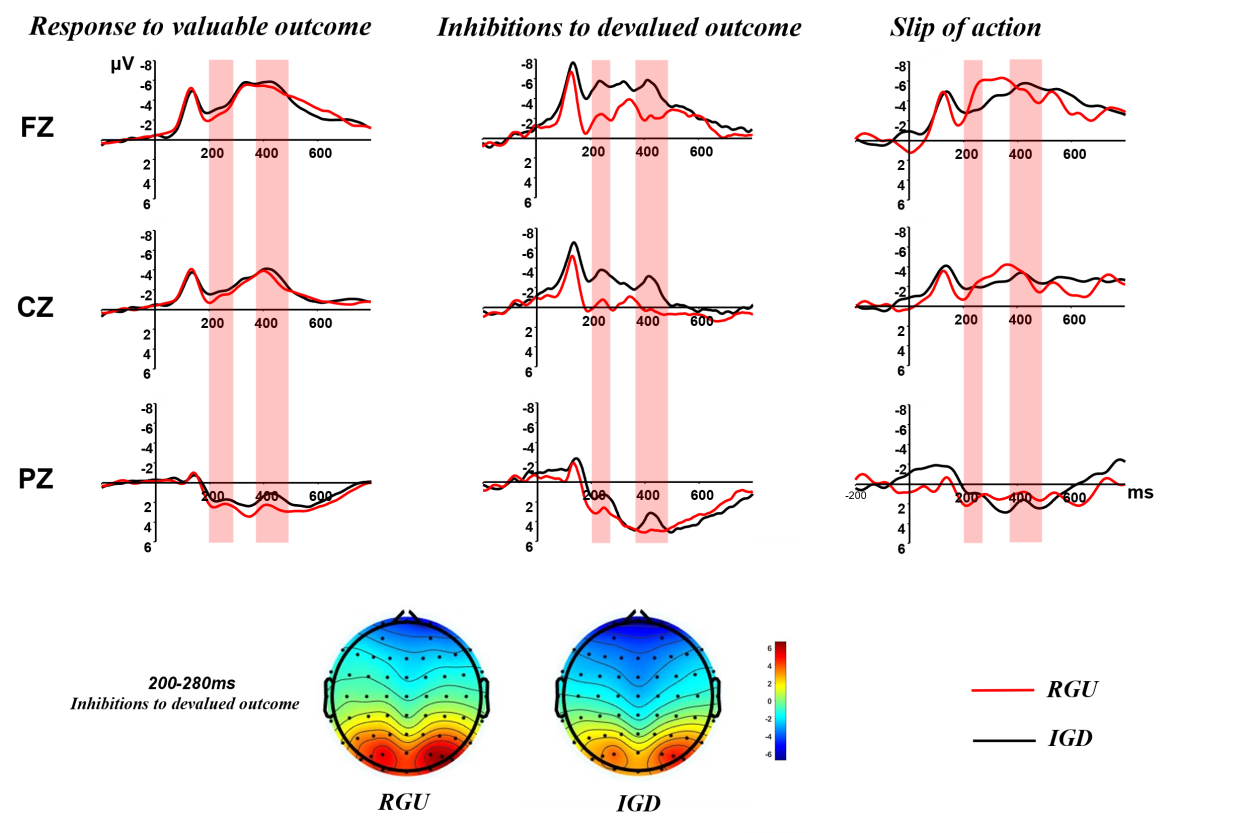近日,高雪梅教授团队在行为成瘾领域权威期刊《Journal of Behavioral Addictions》(JCR: Q1,中科院一区,IF5=7.3)发表题为《Increasingly dependent on habit? A study on the electrophysiological mechanisms of goal-directed and habitual control in internet gaming disorder》的论文,使用结果贬值范式对 IGD 高风险者的行为模式和神经机制进行研究。
在先前的成瘾研究中,人类精神疾病中存在的不良习惯行为已经被证明,习惯系统逐渐劫持大脑,个体会表现出对结果贬值的不敏感性,即更依赖于习惯。本研究的行为研究结果表明,在操作性学习反应的建立过程中,尽管IGD组和RGU组的学习成绩稳步提高并保持在较高水平,但其习惯性反应建立的成绩弱于RGU组,这表明过度沉迷于网络游戏可能会影响个体与奖励相关的强化学习能力。在打破习惯的过程中,IGD表现出对结果贬值的不敏感性。

Figure 1. Stimulus-locked ERPs during the slips-of-action test between IGD (black line) and RGU (red line). ERPs at Fz, Cz and Pz time-locked to stimuli preceding responses to valuable outcomes preceding slips of action and preceding inhibitions to devalued outcomes. Topographies depict the differences between stimuli preceding inhibitions to devalued at the indicated time windows.
脑电研究结果表明,IGD激活了较大的N2,表明IGD高风险者需要更多的认知资源和努力才能在抑制控制任务中取得正确的结果,这可能与其抑制控制能力下降密切相关,且IGD的严重程度可以预测N2和P3在正确抑制阶段的平均幅度,即IGD会降低个体激活目标导向行为的能力,表现出对习惯的过度依赖。
这项研究首次为IGD的习惯控制与目标导向系统如何表征提供了电生理学上的依据,研究揭示抑制成功阶段的N2成分可能在未来成为IGD的潜在神经标志物,这将帮助我们更好地理解IGD的神经机制,并且为未来IGD的预防和干预提供习惯改变和塑造的思路。
高雪梅教授及其团队硕士生鲁江淼为论文共同第一作者,研究得到了国家社会科学基金、重庆市自然科学基金等基金支持。
论文信息:
Gao, X*, Lu, J., Huang, Y., & Wang, L. (2025). Increasingly dependent on habit? A study on the electrophysiological mechanisms of goal–directed and habitual control in internet gaming disorder. Journal of Behavioral Addictions (published online ahead of print 2025). https://doi.org/10.1556/2006.2024.00084
团队相关论文:
1. Yuhong Zhou, Xin Lv, Ling Wang, Jiayu Li, Xuemei Gao*. (2023). What increases the risk of gamers being addicted? An integrated network model of personality–emotion–motivation of gaming disorder. Computers in Human Behavior, 141. https://doi.org/10.1016/j.chb.2022.107647
2. Yuzhou Chen, Xuemei Gao*. (2023). Intentional forgetting in excessive behavior: direct suppression and thought substitution, Addiction Research & Theory, 31:6, 468-475. https://doi.org/10.1080/16066359.2023.2210839
3. Shijie Chen, Hongwei Wen, Yuhong Zhou, Xinyu Huang, Xuemei Gao*. (2024). Neurobiological Correlates of Reactive Aggression in Young Adults with Internet Gaming Disorder. Brain Research Bulletin, 111133.
https://doi.org/10.1016/j.brainresbull.2024.111133.



